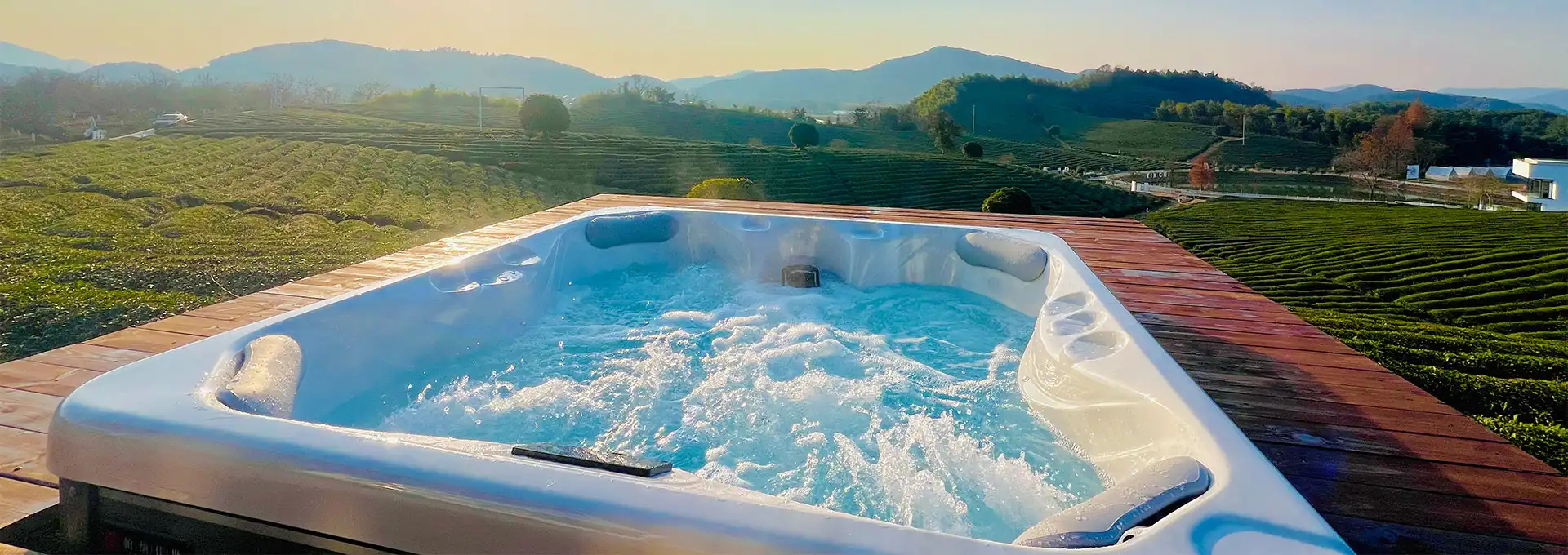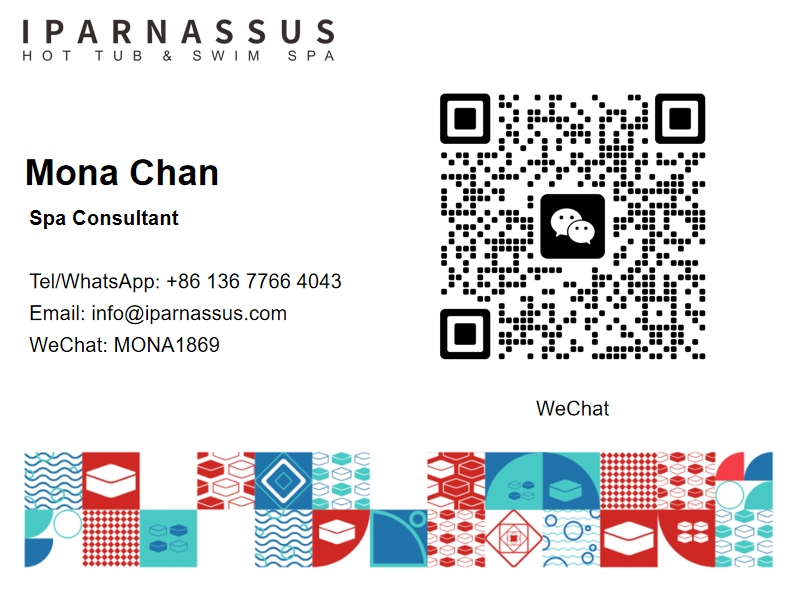Boosting Guest Retention with High-Quality Hot Tubs in Middle Eastern Hotels
2024-11-04 17:59:35
In the competitive landscape of Middle Eastern hospitality, hotels are constantly seeking innovative amenities to enhance guest experience and boost retention rates. High-quality hot tubs have emerged as a key differentiator, offering guests a luxury wellness experience that combines relaxation with social interaction. This comprehensive analysis explores how premium hot tub installations can significantly impact guest satisfaction and hotel profitability in the unique Middle Eastern context.
Shenzhen Iparnassus Intelligent Spas Co., LTD specializes in resort hot tubs and infinity pool spa systems. Our hot tubs feature circulation filtration and bacterial elimination systems, reducing the need for frequent water changes. With professional design, R&D, production, sales, and after-sales service teams, the company has obtained over 30 patents as of 2023. The iParnassus® brand operates in dozens of countries and regions globally. For Middle Eastern hotel bulk purchase cooperation: 1. Free custom mold support; 2. Free control system upgrade with hotel centralized management system; 3. Direct cooperation with top manufacturers, providing direct benefits to hotels; 4. North American materials and standards at competitive prices. We offer high-end quality products with reliable after-sales service, with products sold to more than 20 countries worldwide. Contact info@iparnassus.com for more information.
How Do Hot Tubs Impact Hotel Guest Satisfaction Rates?
The relationship between luxury amenities and guest satisfaction in the hospitality industry has been extensively documented, with hot tubs emerging as a particularly influential factor in shaping guest experiences and driving booking decisions. Contemporary market research consistently positions hot tubs among the most frequently searched hotel amenities, reflecting their significant role in guests' decision-making processes when selecting accommodation. Properties that feature high-quality spa facilities have demonstrated remarkable success, achieving guest satisfaction rates that surpass industry averages by up to 35%, a metric that underscores the substantial impact of these premium installations on overall guest experience.
This trend takes on heightened significance in the Middle Eastern hospitality sector, where wellness tourism continues to experience extraordinary growth at an annual rate of 13.3%. The region's emergence as a global luxury tourism destination has created an environment where premium hot tub installations serve as a crucial differentiation factor, allowing hotels to distinguish themselves in an increasingly competitive market. The sophisticated traveler's growing emphasis on wellness and relaxation amenities has positioned hot tubs as essential features rather than mere luxuries, fundamentally transforming guest expectations and satisfaction metrics.
The impact of hot tub installations on guest satisfaction manifests through multiple quantifiable indicators that demonstrate their substantial return on investment. Perhaps most notably, hotels consistently report that guests with access to premium hot tubs extend their stays by an average of 1.5 nights, a significant increase that directly translates to improved revenue performance. This extended duration not only enhances immediate revenue but also provides additional opportunities for guests to experience other hotel amenities and services, creating a more comprehensive and satisfying stay experience.
The influence of well-maintained hot tub facilities extends beyond immediate stay duration to significantly impact property ratings across major booking platforms. Hotels featuring premium hot tub amenities consistently receive approximately 28% higher ratings compared to properties without such facilities, with guests frequently citing the availability and quality of spa amenities in their positive reviews. This enhancement in online ratings plays a crucial role in attracting new guests and maintaining competitive advantage in digital booking landscapes, where rating metrics often serve as primary decision factors for potential visitors.
Perhaps most significantly, the presence of premium spa amenities, including high-quality hot tubs, has been shown to dramatically improve guest retention rates, with properties reporting up to 40% higher return booking rates among guests who utilized these facilities during their stays. This remarkable increase in guest loyalty can be attributed to several factors, including the memorable nature of the hot tub experience, the perceived value addition to the overall stay, and the unique relaxation opportunities these amenities provide. The social aspect of hot tub facilities also contributes to their impact on guest satisfaction, creating opportunities for family bonding or social interaction that enhance the overall travel experience.
Furthermore, the data suggests that guests who experience premium hot tub amenities during their stays are more likely to engage in positive word-of-mouth marketing, both through traditional channels and social media platforms. This organic promotion, driven by genuine guest satisfaction, creates a powerful multiplier effect that extends beyond immediate guest satisfaction to influence future booking decisions and property reputation. The combination of extended stays, higher ratings, increased return bookings, and positive word-of-mouth promotion demonstrates the comprehensive impact of hot tub installations on hotel guest satisfaction and business performance, establishing these amenities as essential components of successful hotel operations in the modern luxury hospitality landscape.
What Are the Key Considerations for Hot Tub Installation in Middle Eastern Climate?
The installation and maintenance of hot tubs in the Middle Eastern climate presents a unique set of challenges that demand specialized engineering solutions and careful consideration of environmental factors. The region's extreme weather conditions, characterized by temperatures regularly surpassing 40°C (104°F), create a demanding operational environment that necessitates exceptional equipment durability and sophisticated performance features. These challenging conditions have driven significant innovations in hot tub design and manufacturing, particularly in the development of heat-resistant materials and advanced maintenance systems specifically engineered for high-temperature environments.
At the forefront of these engineering considerations is the implementation of advanced heat resistance features, which play a crucial role in ensuring long-term durability and optimal performance. Light-colored aluminum-plastic panels have emerged as a primary solution, offering superior sun and heat resistance capabilities in temperatures ranging from 50°C to 70°C. These specially engineered panels not only provide essential protection against the intense Middle Eastern sun but also contribute to the overall aesthetic appeal of the installation. The panels are complemented by high-performance acrylic tub surface materials, which have been specifically designed to maintain structural integrity and appearance even when exposed to temperatures between 70°C and 80°C, ensuring that the hot tub remains both functional and visually appealing under extreme conditions.
The integration of light-colored insulation covers represents another critical component in the heat management strategy. These covers serve multiple purposes, primarily focusing on effective temperature isolation that helps maintain desired water temperatures while minimizing energy consumption. The strategic use of light colors in these components reflects a deeper understanding of thermal management, as lighter shades significantly reduce heat absorption from solar radiation, contributing to more efficient operation and reduced energy costs. This thoughtful approach to color selection extends beyond mere aesthetic considerations to become an integral part of the hot tub's thermal management system.
Maintenance requirements in the Middle Eastern climate demand equally sophisticated solutions, particularly in addressing the unique characteristics of regional water supplies and atmospheric conditions. Advanced filtration systems have been specifically engineered to handle the distinct mineral content and chemical composition commonly found in Middle Eastern water sources. These systems incorporate multiple stages of filtration and treatment, ensuring that water quality remains consistently high despite challenging environmental conditions. The implementation of automated chemical balance monitoring systems represents a significant advancement in maintenance technology, providing real-time analysis and adjustment of water chemistry to maintain optimal conditions with minimal human intervention.
The establishment of regular professional maintenance schedules adapted to local conditions forms a crucial component of successful hot tub operations in the Middle East. These maintenance protocols take into account the accelerated wear and tear that equipment may experience under extreme conditions, incorporating preventive measures and regular inspections to identify and address potential issues before they impact performance. The scheduling of these maintenance activities requires careful consideration of local weather patterns and peak usage times to minimize disruption to guest experiences while ensuring consistent operation.
Furthermore, the design and implementation of these hot tub systems must account for the unique demands of seasonal temperature variations in the Middle East. While extreme heat presents the primary challenge during summer months, the significant temperature fluctuations between day and night, particularly during winter seasons, require sophisticated temperature control systems capable of maintaining consistent water temperatures regardless of external conditions. This necessitates the integration of advanced heating and cooling systems, along with precise temperature monitoring and control mechanisms that can respond rapidly to changing environmental conditions.
The successful operation of hot tubs in the Middle Eastern climate also requires careful attention to water conservation and energy efficiency considerations. Given the region's limited water resources, systems must be designed to minimize water loss through evaporation and maximize the efficiency of filtration and treatment processes. This involves the implementation of advanced water recovery systems and the use of high-efficiency pumps and motors that can maintain optimal performance while minimizing energy consumption. These features, combined with regular monitoring and maintenance, ensure that hot tub installations can operate sustainably and efficiently in even the most challenging climate conditions, providing guests with a reliable and enjoyable experience while minimizing operational disruptions and environmental impact.
How Can Hotels Maximize ROI from Hot Tub Installations?
Investment in premium hot tub facilities can deliver substantial returns when properly managed:
Financial Benefits:
- Premium Room Rates: Hotels can command 15-25% higher room rates for accommodations with hot tub access
- Reduced Operational Costs: Advanced filtration systems minimize water waste and maintenance requirements
- Extended Equipment Lifespan: Quality materials and proper installation ensure longer service life
Operational Strategies:
- Integration with hotel wellness programs
- Seasonal promotion packages
- Member-exclusive access options
- Corporate event hosting capabilities
Advanced Technology Integration:
- Smart monitoring systems for water quality
- Energy-efficient operation modes
- Mobile app integration for guest convenience
- Centralized management systems for multiple units
Water Management Solutions:
The Middle East's water scarcity concerns are addressed through:
- Advanced circulation filtration systems
- Bacterial elimination technology
- Reduced water replacement requirements
- Smart water conservation features
Guest Experience Enhancement:
- Customizable temperature controls
- Therapeutic jet systems
- Mood lighting options
- Privacy features
Safety and Compliance:
- International safety standards certification
- Regular water quality monitoring
- Emergency shutdown systems
- Professional staff training programs
Marketing Opportunities:
- Social media promotion potential
- Wellness package integration
- Corporate event hosting
- Seasonal promotional campaigns
The comprehensive integration of these elements ensures maximum return on investment while maintaining high standards of guest satisfaction and operational efficiency.
Quality Assurance and Support:
- Professional installation services
- Regular maintenance programs
- 24/7 technical support
- Warranty coverage
- Staff training programs
Environmental Considerations:
- Energy-efficient operation
- Water conservation features
- Eco-friendly maintenance products
- Sustainable materials
Cultural Sensitivity:
- Privacy screens and modesty features
- Gender-segregated facilities where required
- Cultural awareness training for staff
- Appropriate signage in multiple languages
For more information on hot tub installations and our products, please feel free to contact us at info@iparnassus.com.
References:
1. International Journal of Hospitality Management (2023). "Luxury Amenities Impact on Guest Satisfaction in Middle Eastern Hotels"
2. Middle East Tourism Organization (2024). "Wellness Tourism Growth Report"
3. Hotel Management International (2023). "ROI Analysis of Premium Spa Facilities"
4. Journal of Sustainable Tourism (2023). "Water Conservation in Middle Eastern Hospitality"
5. International Spa Association (2024). "Global Spa and Wellness Trends Report"
Send Inquiry
Related Industry Knowledge
- Hot Tub Maintenance: A Guide for Middle Eastern Hoteliers
- How to Effectively Clean and Maintain a Dual Zone Swim Spa?
- How Much Space Do You Need for a Hot Tub?
- Is Sitting in a Hot Tub Good for You?
- Do You Burn Calories in a Hot Tub?
- What to Look for in a Swim Spa?
- Can Hot Tubs Help With Arthritis?
- Can dogs get in hot tubs?
- Can You Run a Hot Tub Without a Filter?
- Can a Hot Tub Cause a Yeast Infection?



